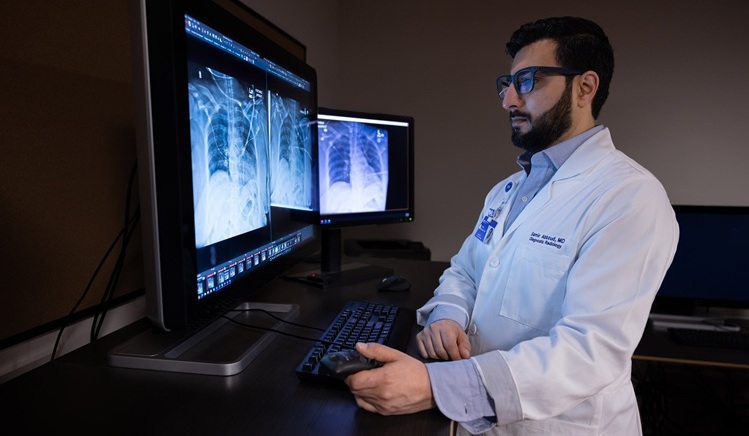DICOM System Helps Radiology Groups Transform the Practice of Radiology
|
By MedImaging International staff writers Posted on 30 Jul 2013 |
A new Digital Imaging and Communications in Medicine (DICOM) system was able to demonstrate improved earlier exam prefetch by customizing queries to remote picture archiving communication systems (PACS), thereby reducing the need for staff intervention, and improving network utilization.
The Foundation Radiology Group (Pittsburgh, PA, USA), a radiology practice that brings a team of imaging experts to community hospitals across Pennsylvania and the surrounding states, was seeking a technology solution to enhance the retrieval, transport, and standardization DICOM data from their hospital partners. After an extensive request for proposal (RFP) process, the radiology group found a teleradiology interoperability company, Dicom Systems’ (DCMSYS; Campbell, CA, USA) DICOM and HL7 router to be a suitable choice. Dicom Systems’ router also displayed strength in the transformation of DICOM elements and has greatly reduced efforts required to ensure data are correctly stored with in Foundation’s core systems without intervention. Dicom Systems scripting tools allow Foundation to easily accommodate integration with any PACS and RIS vendor.
Kevin Mahood, PACS administrator at Foundation explained, “Foundation Radiology Group performs final subspecialized interpretations on over 3,000 exams a day. Before interpretation, all exams have to be properly adopted into our core systems along with any relevant prior exams. This process can be time-consuming for both hospital and Foundation staff. With the introduction of Dicom Systems advanced transformation and automated prior capabilities, Foundation has been able to automate this process. Nonconformant DICOM data can be automatically corrected with Dicom Systems technology. Furthermore, advanced prior configuration allows the core system to query the site PACS for relevant priors without staff intervention. The Dicom Systems solution is now our standard platform for DICOM integration, and will be utilized for both DICOM and HL[Health Level]7 integrations moving forward.”
Dicom Systems offers a 100% secure web-based DICOM and HL7 routing and interface engine appliance for hospitals, clinics, and diagnostic imaging centers. Its proprietary technology dramatically simplifies the client’s information technology (IT) structure by applying industry standard protocols, such as SNMP, SSL/TLS, DICOM, and HL7, thereby enabling users incredibly fast and effective access to information regardless of their physical location within the enterprise. Trusted by top healthcare facilities, and providing the most effective integrated workflow in digital imaging, Campbell-based Dicom Systems ensures that physicians, practitioners, and diagnosticians have the most reliable and immediate access to patient data from across their healthcare enterprises.
Related Links:
Foundation Radiology Group
Dicom Systems
The Foundation Radiology Group (Pittsburgh, PA, USA), a radiology practice that brings a team of imaging experts to community hospitals across Pennsylvania and the surrounding states, was seeking a technology solution to enhance the retrieval, transport, and standardization DICOM data from their hospital partners. After an extensive request for proposal (RFP) process, the radiology group found a teleradiology interoperability company, Dicom Systems’ (DCMSYS; Campbell, CA, USA) DICOM and HL7 router to be a suitable choice. Dicom Systems’ router also displayed strength in the transformation of DICOM elements and has greatly reduced efforts required to ensure data are correctly stored with in Foundation’s core systems without intervention. Dicom Systems scripting tools allow Foundation to easily accommodate integration with any PACS and RIS vendor.
Kevin Mahood, PACS administrator at Foundation explained, “Foundation Radiology Group performs final subspecialized interpretations on over 3,000 exams a day. Before interpretation, all exams have to be properly adopted into our core systems along with any relevant prior exams. This process can be time-consuming for both hospital and Foundation staff. With the introduction of Dicom Systems advanced transformation and automated prior capabilities, Foundation has been able to automate this process. Nonconformant DICOM data can be automatically corrected with Dicom Systems technology. Furthermore, advanced prior configuration allows the core system to query the site PACS for relevant priors without staff intervention. The Dicom Systems solution is now our standard platform for DICOM integration, and will be utilized for both DICOM and HL[Health Level]7 integrations moving forward.”
Dicom Systems offers a 100% secure web-based DICOM and HL7 routing and interface engine appliance for hospitals, clinics, and diagnostic imaging centers. Its proprietary technology dramatically simplifies the client’s information technology (IT) structure by applying industry standard protocols, such as SNMP, SSL/TLS, DICOM, and HL7, thereby enabling users incredibly fast and effective access to information regardless of their physical location within the enterprise. Trusted by top healthcare facilities, and providing the most effective integrated workflow in digital imaging, Campbell-based Dicom Systems ensures that physicians, practitioners, and diagnosticians have the most reliable and immediate access to patient data from across their healthcare enterprises.
Related Links:
Foundation Radiology Group
Dicom Systems
Latest Imaging IT News
- New Google Cloud Medical Imaging Suite Makes Imaging Healthcare Data More Accessible
- Global AI in Medical Diagnostics Market to Be Driven by Demand for Image Recognition in Radiology
- AI-Based Mammography Triage Software Helps Dramatically Improve Interpretation Process
- Artificial Intelligence (AI) Program Accurately Predicts Lung Cancer Risk from CT Images
- Image Management Platform Streamlines Treatment Plans
- AI-Based Technology for Ultrasound Image Analysis Receives FDA Approval
- AI Technology for Detecting Breast Cancer Receives CE Mark Approval
- Digital Pathology Software Improves Workflow Efficiency
- Patient-Centric Portal Facilitates Direct Imaging Access
- New Workstation Supports Customer-Driven Imaging Workflow
Channels
Radiography
view channel
AI Radiology Tool Identifies Life-Threatening Conditions in Milliseconds
Radiology is emerging as one of healthcare’s most pressing bottlenecks. By 2033, the U.S. could face a shortage of up to 42,000 radiologists, even as imaging volumes grow by 5% annually.... Read more
Machine Learning Algorithm Identifies Cardiovascular Risk from Routine Bone Density Scans
A new study published in the Journal of Bone and Mineral Research reveals that an automated machine learning program can predict the risk of cardiovascular events and falls or fractures by analyzing bone... Read more
AI Improves Early Detection of Interval Breast Cancers
Interval breast cancers, which occur between routine screenings, are easier to treat when detected earlier. Early detection can reduce the need for aggressive treatments and improve the chances of better outcomes.... Read more
World's Largest Class Single Crystal Diamond Radiation Detector Opens New Possibilities for Diagnostic Imaging
Diamonds possess ideal physical properties for radiation detection, such as exceptional thermal and chemical stability along with a quick response time. Made of carbon with an atomic number of six, diamonds... Read moreMRI
view channel
New MRI Technique Reveals Hidden Heart Issues
Traditional exercise stress tests conducted within an MRI machine require patients to lie flat, a position that artificially improves heart function by increasing stroke volume due to gravity-driven blood... Read more
Shorter MRI Exam Effectively Detects Cancer in Dense Breasts
Women with extremely dense breasts face a higher risk of missed breast cancer diagnoses, as dense glandular and fibrous tissue can obscure tumors on mammograms. While breast MRI is recommended for supplemental... Read moreUltrasound
view channel
New Incision-Free Technique Halts Growth of Debilitating Brain Lesions
Cerebral cavernous malformations (CCMs), also known as cavernomas, are abnormal clusters of blood vessels that can grow in the brain, spinal cord, or other parts of the body. While most cases remain asymptomatic,... Read more.jpeg)
AI-Powered Lung Ultrasound Outperforms Human Experts in Tuberculosis Diagnosis
Despite global declines in tuberculosis (TB) rates in previous years, the incidence of TB rose by 4.6% from 2020 to 2023. Early screening and rapid diagnosis are essential elements of the World Health... Read moreNuclear Medicine
view channel
New Imaging Approach Could Reduce Need for Biopsies to Monitor Prostate Cancer
Prostate cancer is the second leading cause of cancer-related death among men in the United States. However, the majority of older men diagnosed with prostate cancer have slow-growing, low-risk forms of... Read more
Novel Radiolabeled Antibody Improves Diagnosis and Treatment of Solid Tumors
Interleukin-13 receptor α-2 (IL13Rα2) is a cell surface receptor commonly found in solid tumors such as glioblastoma, melanoma, and breast cancer. It is minimally expressed in normal tissues, making it... Read moreGeneral/Advanced Imaging
view channel
CT Colonography Beats Stool DNA Testing for Colon Cancer Screening
As colorectal cancer remains the second leading cause of cancer-related deaths worldwide, early detection through screening is vital to reduce advanced-stage treatments and associated costs.... Read more
First-Of-Its-Kind Wearable Device Offers Revolutionary Alternative to CT Scans
Currently, patients with conditions such as heart failure, pneumonia, or respiratory distress often require multiple imaging procedures that are intermittent, disruptive, and involve high levels of radiation.... Read more
AI-Based CT Scan Analysis Predicts Early-Stage Kidney Damage Due to Cancer Treatments
Radioligand therapy, a form of targeted nuclear medicine, has recently gained attention for its potential in treating specific types of tumors. However, one of the potential side effects of this therapy... Read moreIndustry News
view channel
GE HealthCare and NVIDIA Collaboration to Reimagine Diagnostic Imaging
GE HealthCare (Chicago, IL, USA) has entered into a collaboration with NVIDIA (Santa Clara, CA, USA), expanding the existing relationship between the two companies to focus on pioneering innovation in... Read more
Patient-Specific 3D-Printed Phantoms Transform CT Imaging
New research has highlighted how anatomically precise, patient-specific 3D-printed phantoms are proving to be scalable, cost-effective, and efficient tools in the development of new CT scan algorithms... Read more
Siemens and Sectra Collaborate on Enhancing Radiology Workflows
Siemens Healthineers (Forchheim, Germany) and Sectra (Linköping, Sweden) have entered into a collaboration aimed at enhancing radiologists' diagnostic capabilities and, in turn, improving patient care... Read more


















